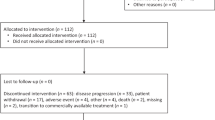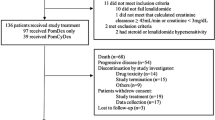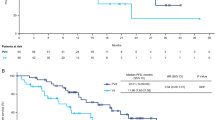Abstract
Patients with multiple myeloma progressing on current therapies have limited treatment options. Pomalidomide (CC4047), an immunomodulatory drug, has significant activity in relapsed myeloma and previous studies suggest activity in lenalidomide refractory disease. To better define its efficacy in this group, we treated a cohort of lenalidomide refractory patients. Pomalidomide was given orally (2 mg) daily, continuously in 28-day cycles along with dexamethasone (40 mg) given weekly. Responses were assessed by the International Myeloma Working Group Criteria. Thirty-four patients were enrolled. The best response was very good partial response in 3 (9%), partial response (PR) in 8 (23%), best responses (MR) in 5 (15%), stable disease in 12 (35%) and progressive disease in 6 (18%), for an overall response rate of 47%. Of the 14 patients that were considered high risk, 8 (57%) had responses including 4 PR and 4 MR. The median time to response was 2 months and response duration was 9.1 months, respectively. The median overall survival was 13.9 months. Toxicity was primarily hematologic, with grade 3 or 4 toxicity seen in 18 patients (53%) consisting of anemia (12%), thrombocytopenia (9%) and neutropenia (26%). The combination of pomalidomide and dexamethasone (Pom/dex) is highly active and well tolerated in patients with lenalidomide-refractory myeloma.
This is a preview of subscription content, access via your institution
Access options
Subscribe to this journal
Receive 12 print issues and online access
$259.00 per year
only $21.58 per issue
Buy this article
- Purchase on Springer Link
- Instant access to full article PDF
Prices may be subject to local taxes which are calculated during checkout

Similar content being viewed by others
References
Schey SA, Fields P, Bartlett JB, Clarke IA, Ashan G, Knight RD et al. Phase I study of an immunomodulatory thalidomide analog, CC-4047, in relapsed or refractory multiple myeloma. J Clin Oncol 2004; 22: 3269–3276.
Streetly MJ, Gyertson K, Daniel Y, Zeldis JB, Kazmi M, Schey SA . Alternate day pomalidomide retains anti-myeloma effect with reduced adverse events and evidence of in vivo immunomodulation. Br J Haematol 2008; 141: 41–51.
D’Amato RJ, Loughnan MS, Flynn E, Folkman J . Thalidomide is an inhibitor of angiogenesis. Proc Natl Acad Sci USA 1994; 91: 4082–4085.
Keifer JA, Guttridge DC, Ashburner BP, Baldwin Jr AS . Inhibition of NF-kappa B activity by thalidomide through suppression of IkappaB kinase activity. J Biol Chem 2001; 276: 22382–22387.
Mitsiades N, Mitsiades CS, Poulaki V, Chauhan D, Richardson PG, Hideshima T et al. Apoptotic signaling induced by immunomodulatory thalidomide analogs in human multiple myeloma cells: therapeutic implications. Blood 2002; 99: 4525–4530.
Turk BE, Jiang H, Liu JO . Binding of thalidomide to alpha1-acid glycoprotein may be involved in its inhibition of tumor necrosis factor alpha production. Proc Natl Acad Sci USA 1996; 93: 7552–7556.
Hayashi T, Hideshima T, Anderson KC . Novel therapies for multiple myeloma. Br J Haematol 2003; 120: 10–17.
Knight R . IMiDs: A Novel Class of Immunomodulators. Semin Oncol 2005; 32: 24–30.
Davies FE, Raje N, Hideshima T, Lentzsch S, Young G, Tai YT et al. Thalidomide and immunomodulatory derivatives augment natural killer cell cytotoxicity in multiple myeloma. Blood 2001; 98: 210–216.
Reddy N, Hernandez-Ilizaliturri FJ, Deeb G, Roth M, Vaughn M, Knight J et al. Immunomodulatory drugs stimulate natural killer-cell function, alter cytokine production by dendritic cells, and inhibit angiogenesis enhancing the anti-tumour activity of rituximab in vivo. Br J Haematol 2008; 140: 36–45.
Corral LG, Haslett PA, Muller GW, Chen R, Wong LM, Ocampo CJ et al. Differential cytokine modulation and T cell activation by two distinct classes of thalidomide analogues that are potent inhibitors of TNF-alpha. Journal of Immunology 1999; 163: 380–386.
Haslett PA, Corral LG, Albert M, Kaplan G . Thalidomide costimulates primary human T lymphocytes, preferentially inducing proliferation, cytokine production, and cytotoxic responses in the CD8+ subset. Journal of Experimental Medicine 1998; 187: 1885–1892.
Kyle RA, Rajkumar SV . Criteria for diagnosis, staging, risk stratification and response assessment of multiple myeloma. Leukemia 2009; 23: 3–9.
Durie BGM, Harousseau J-L, Miguel JS, Blade J, Barlogie B, Anderson K et al. International uniform response criteria for multiple myeloma. Leukemia 2006; 20: 1467–1473.
Kumar SK, Mikhael JR, Buadi FK, Dingli D, Dispenzieri A, Fonseca R et al. Management of newly diagnosed symptomatic multiple myeloma: updated mayo stratification of myeloma and risk-adapted therapy (mSMART) consensus guidelines. Mayo Clin Proc 2009; 84: 1095–1110.
Richardson P, Siegel D, Baz R, Kelley SL, Munshi NC, Sullivan D et al. A phase 1/2 multi-center, randomized, open label dose escalation study to determine the maximum tolerated dose, safety, and efficacy of pomalidomide alone or in combination with low-dose examethasone in patients with relapsed and refractory multiple myeloma who have received prior treatment that includes lenalidomide and bortezomib. ASH Annual Meeting Abstracts 2009; 114: 301.
Acknowledgements
This trial was funded by Celgene Corporation.
Author information
Authors and Affiliations
Corresponding author
Ethics declarations
Competing interests
The authors declare no conflict of interest.
Additional information
This study was presented at the American Society of Hematology Annual meeting in New Orleans December 2009.
Rights and permissions
About this article
Cite this article
Lacy, M., Hayman, S., Gertz, M. et al. Pomalidomide (CC4047) plus low dose dexamethasone (Pom/dex) is active and well tolerated in lenalidomide refractory multiple myeloma (MM). Leukemia 24, 1934–1939 (2010). https://doi.org/10.1038/leu.2010.190
Received:
Accepted:
Published:
Issue Date:
DOI: https://doi.org/10.1038/leu.2010.190
Keywords
This article is cited by
-
Harnessing natural killer cells for cancer immunotherapy: dispatching the first responders
Nature Reviews Drug Discovery (2022)
-
Prediction of immunomodulatory drugs (IMiDs) sensitivity in myeloma via determination of baseline anti-oxidative stress capacity
Leukemia (2020)
-
Navigating the treatment landscape in multiple myeloma: which combinations to use and when?
Annals of Hematology (2019)
-
The use of single armed observational data to closing the gap in otherwise disconnected evidence networks: a network meta-analysis in multiple myeloma
BMC Medical Research Methodology (2018)
-
Phase I/II trial of the oral regimen ixazomib, pomalidomide, and dexamethasone in relapsed/refractory multiple myeloma
Leukemia (2018)



